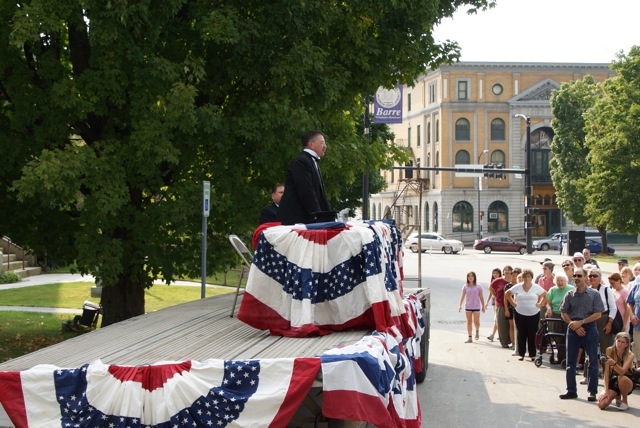
You’ve probably heard of flash mobs: large groups of people carefully choreographed to show up at a mall to sing the Hallelujah chorus or the variant cash mobs who swarm a local book or hardware store.
This past weekend, the city of Barre staged what might be the first ever Teddy Roosevelt Flash Mob to mark the 100th anniversary of the politician’s visit to the area.
In 1912, Theodore Roosevelt visited the city of Barre to rally support for his bid for president. He was the candidate for the Progressive, or Bull Moose, party. Friday marked the 100-year anniversary of Roosevelt’s visit, and to mark the occasion, Barre pulled out all the stops.
While lots has changed in the past 100 years of politics, some things are still the same.
Pretend, for a moment, that it’s August 31, 1912. Teddy Roosevelt has just arrived in Barre, where a throng of people has gathered to hear him speak. Roosevelt is running for a third term in the White House. He’s broken from the GOP to lead a new Progressive party.
"We do say that if you choose to put into power the old parties, you will make no progress toward any solution at all," actor John D. Alexander recited to the crowd in Barre on Friday, acting the part of Roosevelt. "Here in Vermont, I feel we have a peculiar right to make an appeal on behalf of the Progressive Party. You men and women of Vermont represent the very type of American citizen in whom we must trust when we strive to make this government really a government by the people themselves. In the interest of all the people and not any one class of people."
Vermont Historical Society organized the gathering. The goal was to recreate an iconic photograph of Roosevelt addressing the 8,000 Vermonters who turned out to see him.
"We tried to get the stage as close to the original spot," said Tess Taylor is the director of Education and Public Programming. "But darn it, there’s a maple tree that wasn’t there 100 years ago. Pretty much everything else looks the same."
Friday’s crowd was shy of 200 people, but there was plenty of spirit. Old-fashioned hats and dresses abounded. And young newsies sold copies of commemorative newspapers for a penny a piece. "It’s the old-time Barre Daily from 1912," said Zachary Stabell. "It’s called "Throng of 8,000 Saw Roosevelt in Barre Today." (Spoiler alert: Vermont didn’t actually vote for Roosevelt in the 1912 primary election. The incumbent Republican, William Howard Taft, took the state. And of course Woodrow Wilson, the Democrat, beat the both of them in the general election.)
"We think of Vermont today as a very progressive state," said Matt Dickinson, a professor of Political Science at Middlebury College. "But it wasn’t. For a very long time, for most of the twentieth century up until the mid-1970s or so, it was one of the more staunchly conservative states."
But it’s easy to imagine today’s Vermonters rallying behind Roosevelt.
Reporter: "If you were a voter in 1912, would you have voted for Teddy Roosevelt"?
"I like to think that I would have."
"And I would too."
"I would have voted for him."
"I would certainly vote for him if he was running. I’m all for him. I wish he were running now!"
"Uh, I probably would have voted for Eugene Debs, the socialist. I’m that kind of Vermonter."
Vermont’s politics have changed. But in a lot of ways, modern voters are still grappling with issues that haven’t changed since Teddy’s era. "Audience members came up to me afterwards and said that very thing, that there’s so many connections with the present day," said John Alexander, the actor who played Roosevelt. "It’s almost as though the issues hadn’t changed. Or many of them haven’t. Children working in factories is not an issue anymore, but a lot of other issues are still current, in terms of true equality, in terms of labor laws and truth in politics."
And these connections aren’t lost on politicians. Last year, President Obama spoke on another Roosevelt-related anniversary. "But Roosevelt also knew that the free market has never been a free license to take whatever you can from whomever you can," President Obama told a crowd in Osawatamie, Kansas. Political scientist Matt Dickinson says Obama was trying to tap into a Roosevelt ethos, "regulating the trusts and working on behalf of the common man." Dickinson adds, "I think in that sense, yeah, the mythical Roosevelt is a role model for Obama."
Soon enough, Barre’s Roosevelt re-enacters will be casting their ballots – not in the election of 1912, but of 2012.
Note: The historical audio of Teddy Roosevelt in this story was courtesy of Marston Records.